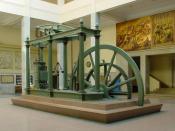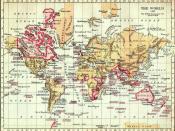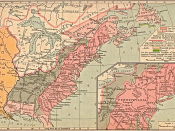During the 18th century, a great change occurred in Britain. Britain became an industrialized country and an empire. The Industrial Revolution can be regarded as a technological change in Britain when manufacturing began to rely on steam power rather than on animal labour or wind power. The overall economic shift towards large scale industry rather than small scale individual operations. The British Empire was expanding rapidly during the 18th century. An empire is a large, multi-ethnic state, whose political structure is held together by force. The British colonised most of Africa, North America, the Pacific, India and parts of Asia and South America. There were British colonies all over the world. The Industrial Revolution and the British Empire are dependant on each other. There would not be an Empire without the Industrial Revolution and vice versa.
Industrial Revolution required a steady and constant supply of raw material Britain itself did not have many raw materials, its weather and landscape did not allow her to grow fine cottons or sugar which were in great demand and valuable back in 18th century.
This was a major obstacle in the way to Industrial Revolution but the British because of its huge empire could get these material through trade. Britain got most of its cotton by trading with India because the Indian cotton were in good quality and were way better than the European ones. Britain also traded with the West Indies for sugar. These raw materials were all manufactured by the factories back in Britain and exported it back to the colonies or other European countries.
Industrial Revolution also required markets for the increasing number of goods it produced and Britain had none of this problem since its Empire was so huge and the British were skillful at shipping. Manufactured goods were exported...


